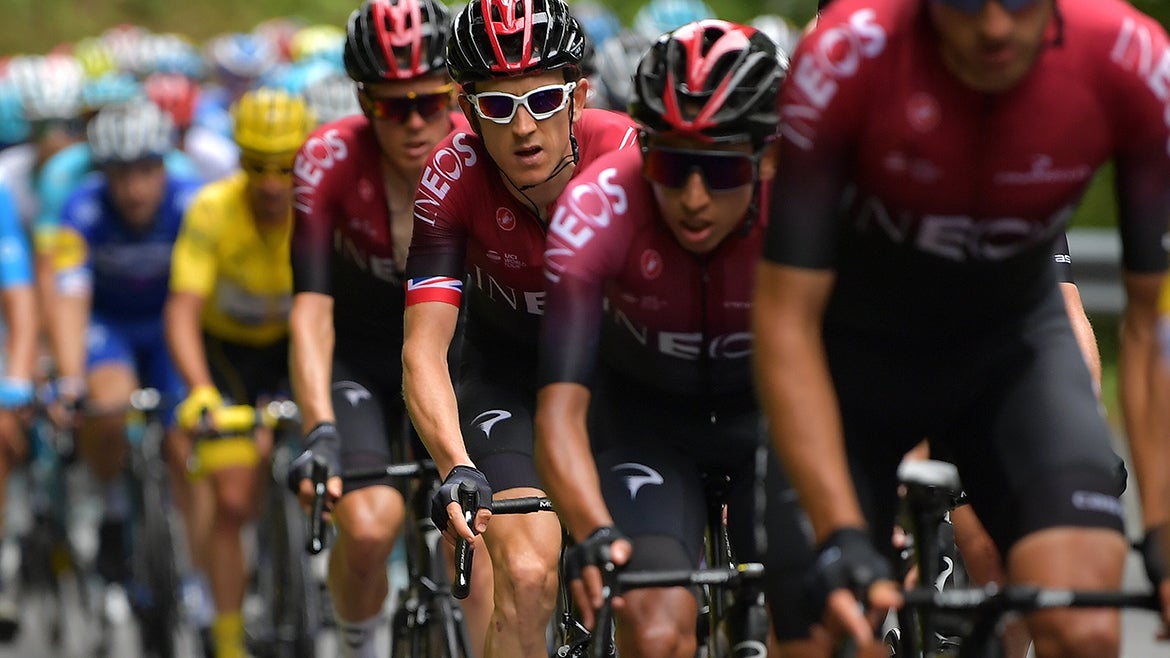Portal defends Ineos big-dollar advantage

Geraint Thomas sat protected in the Team INEOS train. (Photo: Justin Setterfield/Getty Images)
If there’s one thing that bugs everyone inside the Team Ineos bus it’s when critics chime in that the team’s success comes simply because they have the biggest budget in cycling.
The British team does indeed boast the WorldTour’s largest budget — the team’s war chest of about $43 million dwarfs the rest of the field — but Ineos staffers bristle at the suggestion that the team is buying wins.
Nicolas Portal, one of Ineos’s top sport directors, said critics have it backward. Yes, Ineos has the biggest budget, but he says it’s because they’re rewarding success, not buying it.
“One of the reasons the budget goes up is because when a rider wins a grand tour, their price goes up,” Portal told VeloNews. “So if you want to keep them, you must pay more. It’s that simple. You pay them or they go to another team.”
Critics have long bemoaned Sky/Ineos’s budget advantage. Some have even called it “financial doping” and there’s even a movement among some detractors that the UCI should impose budget limitations or salary caps to counter what they say is the team’s unfair advantage.
Right now, cycling’s marketplace is largely unregulated, meaning that teams, agents and riders can bid up — or down — contract prices based on perceived value and future upside. Though still low compared to other top sports, salaries have skyrocketed over the past decade. Top GC riders, major classics or sprinter stars can earn salaries beyond $5-7 million per season.
Most WorldTour teams can afford to match those prices for one marquee rider or perhaps two. What rivals say gives Ineos an advantage with its super-sized budget is its ability to pay second-tier riders very good salaries in order to have them work for leaders. Front-line helpers at Ineos might earn salaries nearing $2 million per season, money that other teams have a hard time matching. As a result, rivals say, Ineos has such a deep squad it can smother race tactics and leave other teams out-gunned.
Portal said that Ineos’s budget has only risen in sync with the rising tide of increasing salaries across the peloton.
“People have to remember for us in 2010, 2011 or 2012, we did not have the biggest budget,” he said in a recent interview. “Other teams had bigger budgets than us. Even in the first years with ‘Froomey,’ we were not the biggest team for budget. Money comes after the results, not the other way around.”
Portal said that kind of criticism and singular obsession on the team’s budget does short shrift for team staffers and coaching staff that he says has helped develop racing talent from within. He admitted that Ineos is active on the marketplace — it recently scooped up the likes of Egan Bernal and Richard Carapaz — but he also pointed out that riders such as Tour de France winners Chris Froome and Geraint Thomas were both homegrown riders from within the Sky/Ineos ecosystem.
“To have so many victories, one after another, with different riders, that means we know how to do this,” he said. “It’s not just about great talent or buying people who are really good. It’s also a big compliment to the staff. We also develop some talent.”
And the other thing that bothers the Ineos crowd? The “B” word.
“Don’t call us boring,” Portal said with a laugh. “Maybe it might appear that way. But it is the winning way. We are 100 percent for the GC. It is a sport and about the work. When you build the team, and a rider is part of that, and all the riders just want to win.”
If there’s a nice paycheck waiting at the end of the day, even better.